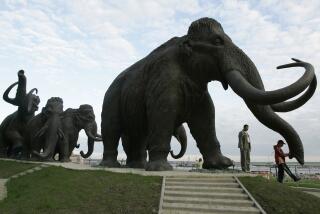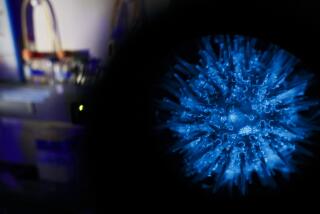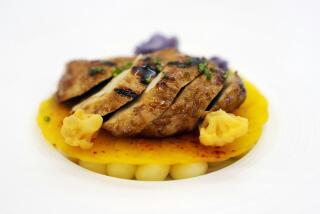Cloned Sheep Is Star, but Not Sole Project, at Institute
- Share via
MIDLOTHIAN, Scotland — Dolly the sheep, history’s first animal cloned from an adult mammal, takes after her mom and grazes in pampered comfort on a research farm here.
Dolly’s sudden fame is gratifying--but hardly surprising--to the researchers who have brought the frontiers of science to the green Scottish farmland. Viewed from the cutting-edge Roslin Institute where Dolly was conceived, she is more beginning than end, one more giant step toward a long-sought goal of improving the lot of farmers, consumers, the sick and the animals themselves.
As the next century dawns, Dolly’s barnyard friends could include leaner chickens with hardier eggs and stronger legs, sheep and cows whose milk fights human diseases, and pigs whose hearts and kidneys can be transplanted into people.
Ian Wilmut, 52, the embryologist who was Dolly’s laboratory father, moved through the media-caused chaos at the institute here Monday with aplomb, switching between a starched white lab coat and a neat blue blazer to suit the caprice of the many television producers.
Wilmut talked patiently about the difficult mechanics of cloning Dolly by fusing a mammary gland cell from one adult ewe with the unfertilized egg of another ewe who became the surrogate mother.
He talked about the potential human medical benefits of his research, which he sees as considerable, and its ethical implications--none for now, but the matter bears watching.
He told beseeching interviewers about his wife and their three grown children, of his pleasure in the fresh air and tranquillity he finds walking the Scottish hills.
He seemed perplexed when a reporter intercepted him in the institute lobby under a wall-sized collage of chickens to inquire why he had chosen to work here. He is, after all, an Englishman who studied at Nottingham and Cambridge. Why rural Scotland, where he came more than 25 years ago when what would become Roslin was still called the Animal Breeding Research Center?
“I wanted to do both applied and research work. I live in the border hills; Edinburgh is 20 miles away. It’s perfect. Besides,” he said with a smile, “the science here is as good as anywhere.”
All that, plus a salary of around $55,000 per year, by one canny estimate. Little wonder then that Roslin is a magnet for some of the best livestock research scientists in Britain--and abroad. In the third year of its current incarnation, after five administrative shuffles in the past two decades, Roslin is an independent, government-supported institute associated with Edinburgh University. Its predecessor was founded by the British government in 1947 to improve British livestock through science and reduce wartime reliance on imported foodstuffs.
Of late, though, money has been increasingly tight, said Harry Griffin, assistant institute director. Government funding has shrunk to around 70% of the budget, the rest coming from contracts with agro-businesses and pharmaceutical companies.
Wilmut and his team, whose work is to be published Thursday in the journal Nature, pioneered the process of growing an animal identical to its mother from scratch. But the institute has long experience in genetically engineering farm animals. “Trans-genic animals require teamwork between a molecular biologist, an embryologist, great surgical skill, available farmland and skilled husbandry. We have them all,” Griffin said.
“This is a world center for excellence. People are attracted here by the high quality of life and exciting science,” said Ron James, general manager of PPL Therapeutics, the biotechnology company that shares the one-story institute’s campus-like setting about half an hour from Edinburgh. PPL supports Wilmut’s research and James is excited at the prospect that genetically engineered sheep could be cloned to expand production of medicines now difficult and expensive to extract.
Some advances will come more quickly than others, he said. “Genetic engineering may be of only limited use . . . but I think we may be seeing disease-resistant animals in a year or two,” said James, whose company has an American subsidiary in Virginia.
Anticipating the swirl of ethical concerns raised by Dolly, James and the institute alerted watchdog groups in Britain; Dolly was not to have made her debut until Wednesday, but a major British newspaper broke the news embargo Saturday, Griffin said.
“Ethically, we would be wrong not to do research that would benefit mankind because it could be misused,” said James. Cloning of human cells is forbidden in Britain and most of Europe but not in the United States.
In Washington, White House Press Secretary Mike McCurry said President Clinton has asked his National Bioethics Advisory Commission to review the “legal and ethical implications” of the new cloning technology, especially as it could apply to humans, and report within 90 days.
*
Here in Scotland, research at Roslin is abstruse and down-to-earth. New benefits for farmers and their stock beckon, for example, with institute studies on more humane feeding trays and cages for laying birds and improved husbandry and transport.
Assistant Director Griffin, a lipid biochemist, has researched ways to produce leaner chickens. The European Union is financing a Roslin project to genetically design a chicken that will be resistant to salmonella, will cost less to feed, will produce eggs with thicker shells and will have stronger legs to keep pace with rapid upper body growth.
Wilmut and his team are stage center now but are quick to acknowledge that research means living with more misses than hits: They impregnated 10 ewes with cloned cells. Dolly, whom sheep fanciers will recognize as a Finn Dorset, is the only one that took.






